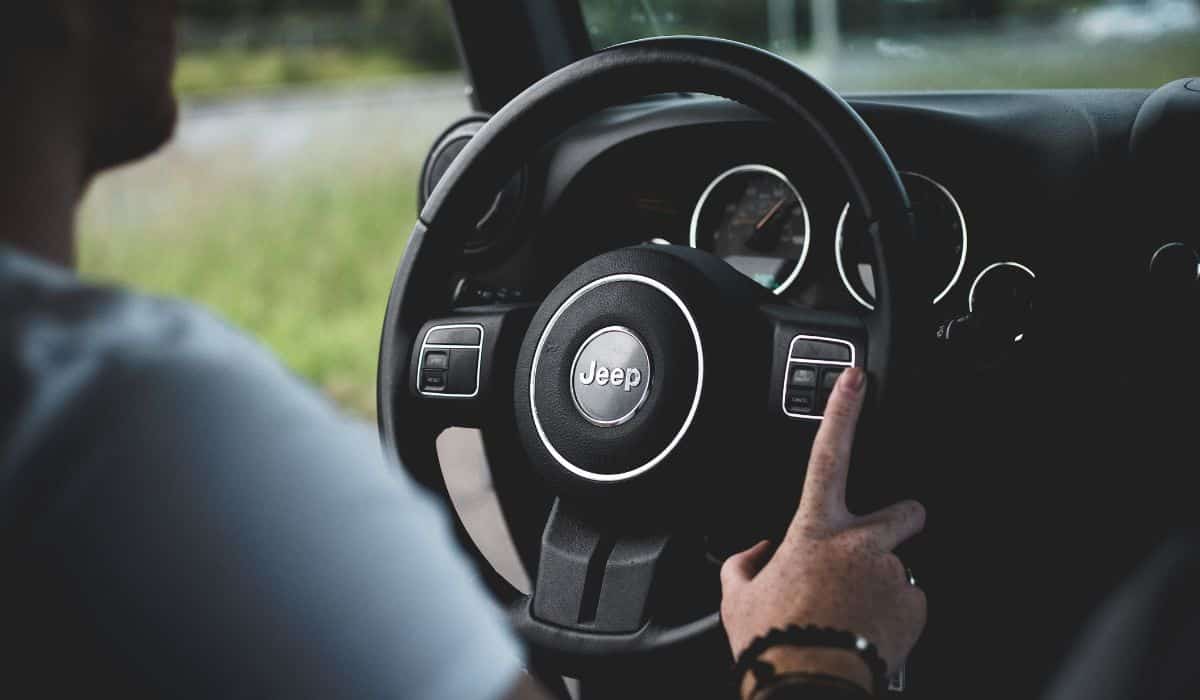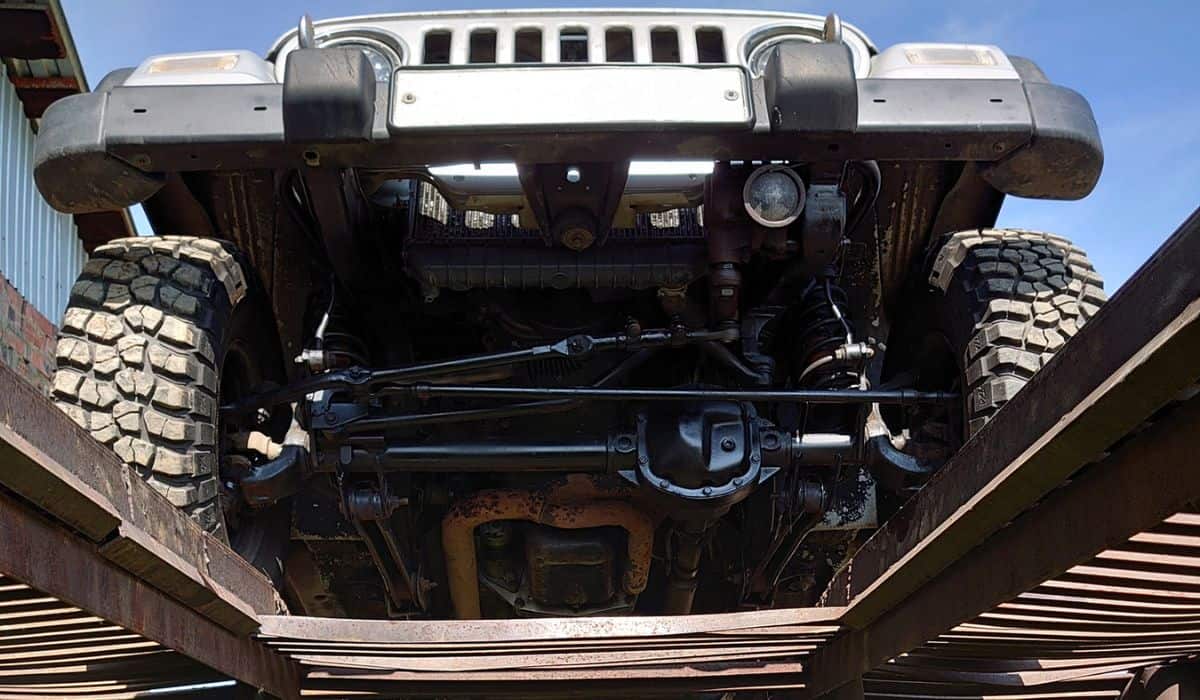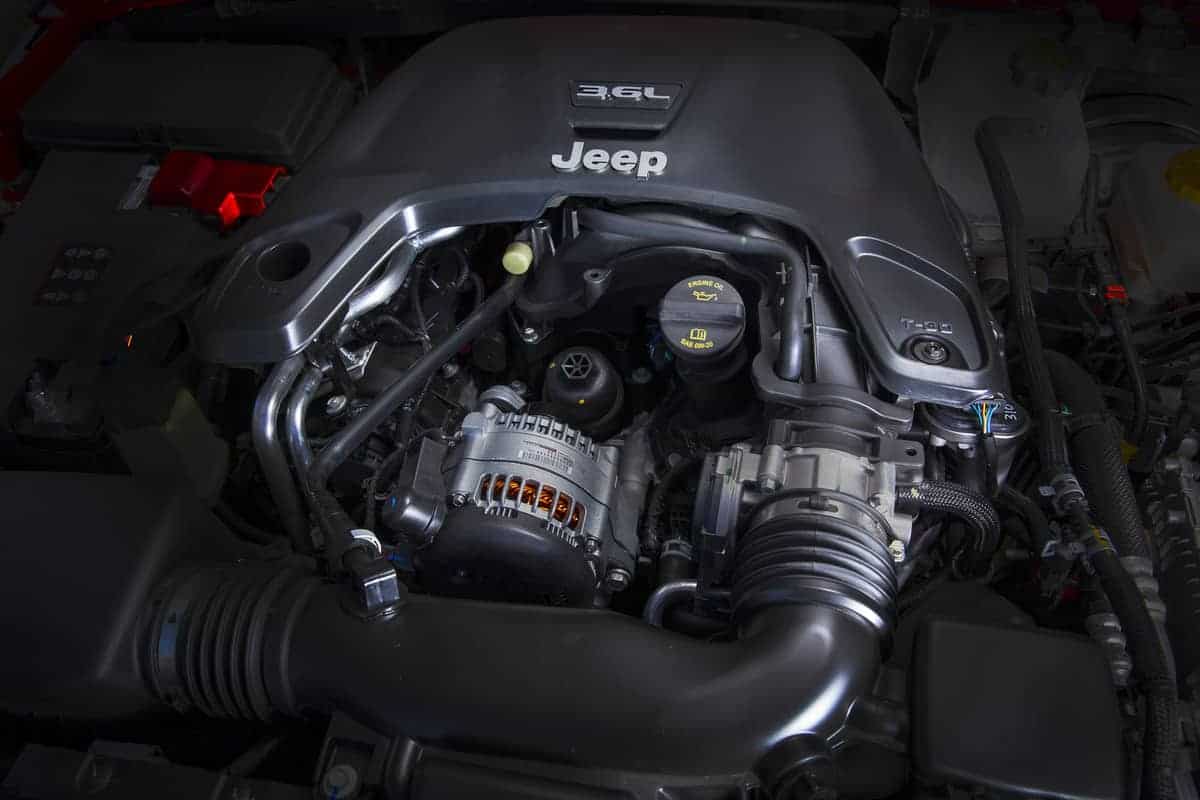Žádné placené akce! Doporučujeme pouze produkty, které se nám líbí.
Skuteční lidé! Náš tým tvoří strojní inženýři, novináři a automobiloví nadšenci s odbornými znalostmi a touhou pomáhat druhým.
Důvěryhodný zdroj! Slouží automobilové komunitě od roku 2016.
Owning a Jeep is handy for driving on various terrains both on and off the road. But like any vehicle, it’s not free from its own share of mechanical issues. For example, what should you do when your Jeep starts revving on its own?
A Jeep revving on its own can be caused by fuel pressure issues or ignition system malfunctions. You might be able to fix it yourself by replacing the spark plugs or fuel pump, but it’s usually better for a mechanic to take a look. The best way to avoid revving is to regularly maintain your Jeep.
Revving in a Jeep should be checked out as soon as possible to discover the cause. But there’s ways that you can both fix and prevent it. Let’s look at some of the possible causes and ways that you can do to stop it.
What is Revving?

Revving is when the RPMs, or revolutions per minute, in your Jeep increase even when you are not pressing on the accelerator.
This is common when you start your vehicle for the first time and the engine is cold. But what happens when the engine continues to rev once it is warmed up, or worse — when you’re driving?
Having your Jeep’s engine rev up out of the blue can be a scary experience, especially if you have never had it happen before. While most people are likely used to the higher RPMs when the car is cold, having this happen at other times can lead you to believe that something is wrong with your Jeep.
Overall, when your Jeep’s engine seems to speed up without you pressing on the gas, you may have issues that have to be dealt with right away. Fixing these problems can take care of the revving and give you peace of mind.
What Causes a Vehicle to Rev on Its Own?
It can be both frustrating and scary to hear your vehicle rev up when you don’t have your foot on the gas. This is typically the result of an issue with the fuel pressure, or a fault in your ignition system.
Here’s a more detailed breakdown of these causes:
Problémy s tlakem paliva
Oftentimes, when the engine is revving uncontrollably in your Jeep, it is indicative of something wrong with the fuel pressure. In some cases, this may mean that the fuel line has malfunctioned; in other cases, the fuel pump may have gone out.
When the fuel line has malfunctioned, the gas cannot go in and out of the engine properly causing your engine to rev to try to accommodate. This can, in turn, wreak havoc in other parts of the fuel system causing them to fail.
The fuel pump is another issue that can be causing your engine to rev when you are not pressing the accelerator pedal. When this part fails, the Jeep engine will lose pressure and not function properly, causing the RPMs to increase without any input from you.
The bottom line is that if you notice that your engine is revving more often than not when it is warmed up, this could mean that you have a problem with the fuel system. Getting to the cause of the problem will help you to get it fixed so your engine does not continue to rev uncontrollably.
Porucha zapalovacího systému
Another cause for your Jeep engine to be revving without you pressing the gas pedal is a problem with your ignition system. Because this system has several factors that could malfunction, it’s important to determine which one is causing the issue.
In many cases, the problem with the ignition system is an issue with the spark plugs. When they don’t work properly, the engine can begin to rev without any input from you or can cause the Jeep not to start at all.
Other issues that could cause unexpected revving in your Jeep engine are the ignition coils that help keep the vehicle running smoothly. When they go bad, one of the things you may experience is an engine that revs on its own.
Diagnosing the issue with your ignition system will likely result in you discovering what is causing the current problem you are experiencing. Once you know the problem, you can then move on to fixing it so your engine does not continue to rev on its own.
How to Stop Your Car From Revving
Although you cannot prevent everything that could go wrong with your Jeep’s engine from happening, there are things you can do to help. Keeping your Jeep serviced regularly can go a long way to keeping your vehicle in the best condition possible.
Here’s a few possible solutions for the revving problem:
Vyměňte palivové čerpadlo
When you notice that your vehicle is not functioning as well as it should be, you may want to either check it out yourself or have a professional mechanic take a look. Doing this at the first sign of trouble can help prevent major issues from occurring unexpectedly.
If you determine that the revving is caused by your fuel pump, you may be able to fix yourself. This, of course, depends on how handy you are with car repair issues.
Keep in mind that several components surround the fuel pump and could easily cause issues to occur. You will want to ensure that the problem is with the pump and not just the fuel filter or something else.
If you need to replace the fuel filter and feel comfortable doing so, you can find helpful guides either in your owner’s manual or online. The internet is full of helpful information that can walk you through replacing your filter. However, you can always take the car to a professional to be fixed.
Zkontrolujte zapalovací svíčky
Another way to prevent your Jeep from revving on its own is to check the spark plugs to ensure they are working properly. When there is a malfunction of the spark plugs, it can cause your car to rev uncontrollably or even misfire when trying to start the engine.
In most cases, checking the spark plugs and even changing them out is an easy fix that you will most likely be able to do on your own. If you are handy with car repairs, the job should take you about an hour or less.
Keep in mind, however, if you do not feel comfortable doing this, you should seek the help of a professional mechanic. In some cases, you can end up causing more harm than good if you are not sure what you are doing.
Look For Lights on the Panel
In most cases, if your Jeep is revving on its own because of a specific engine malfunction, you’ll most likely see a service light come on. This light will give you an insight into where the problem is coming from so you can fix it.
As you are driving, you should always take note of any lights that light up on the panel to ensure that everything is running properly. While sometimes the issue is an easy fix, others may require more extensive work.
Keep in mind that the light panel on your vehicle is designed to let you know if anything is wrong with the engine. Paying attention to these lights can save you a lot of time and money in the long run.
Take It In For Regular Service

An important part of car ownership is having your vehicle serviced regularly. Whether you take it to the dealership or your favorite service shop, you should always keep your Jeep well-maintained.
When you take it in for service, the mechanics will likely ask you if you are having any trouble with the vehicle. If you have been having problems with it revving on its own, they can typically diagnose the problem and fix it in no time.
Skuteční lidé! Náš tým tvoří strojní inženýři, novináři a automobiloví nadšenci s odbornými znalostmi a touhou pomáhat druhým.
Důvěryhodný zdroj! Slouží automobilové komunitě od roku 2016.

When you turn on your Jeep, you may notice that it is a bit louder than you’re used to hearing. This could be a variety of issues causing the problem, but it often suggests a vysoké volnoběžné otáčky. Some Jeep owners run into issues with high idling, which is the rate at which the engine is running when the car is one but not moving.
Why Is My Jeep Idling High?

Why is your Jeep idling high? There are multiple reasons that an engine could be running at a high idle speed but in Jeeps this can often be linked to vacuum leak issues, idle air control (IAC) issues, or throttle malfunctions. If your check gauges light comes on, you should also make sure these items are addressed and that any light mechanisms are in good condition. If you are aware of the common issues that cause idling in Jeeps, it can be an easy thing to recognize and then fix so that you can go back to enjoying your ride. This article will be your guide to explaining what high idling is, why it happens in Jeeps, and how you can prevent it or stop it once it happens.
What is High Idling?
- Fuel Waste: Leaving a car on for an excessive amount of time, especially when idling high, will result in fuel loss. Turning the car off instead of leaving it on for extended periods of time is actually more fuel efficient.
- Residue Build-up: Fuel is not being burnt at its ideal temperature for driving, so excessive idling causing build-up of fuel on the cylinders in the engine.
- Problémy se zapalovacími svíčkami: This buildup will negatively impact your sparkplugs and prevent them from operating as efficiently.
High idling puts much more stress on your engine than standard idling, making these issues even more severe if the car is left to idle at a high rate for too long.
700 RPMs is around normal for idling, and if it is a few hundred over this number, you should address the issue right away.

Why Causes High Idling in Jeeps?
To prevent high idling from occurring, which places greater strain on your engine and its components, you will want to identify the problems that are causing the Jeep to idle. There are some fairly typical high idling problems that occur in these cars.
Some of the common issues you should be aware of and check in the Jeep if you experience high idling are:
- Diagnostické poruchové kódy: These are messages that are connected to the computer in your car to give you information about the health of your engine and other components about the status of your car. These codes can point to potential problems, and many car service places or auto part stores should be able to translate these for you to come to a clearer cause. There could be a malfunction with these codes that are either showing a problem that does not exist or are missing one altogether.
- IAC Valve: The idle air control valve is responsible for controlling the idle speed in your Jeep. If this part is old or weak, it can make the idle engine speed raise or lower more than it should be without a controlling mechanism. If it is dirty, it will also not operate at its ideal setting.
- Netěsnosti vakua: Vacuums in an engine are responsible for maintaining a proper air to fuel ratio, and when this vacuum leaks, the engine thinks that its oxygen level is not high enough. This triggers the engine to work harder and therefore raise the RPM, allowing for high idle.
- Throttle Malfunctions: Often related to dirty intake valves or a crack in these valves, a throttle system that is not working properly can lead to high or low idles in a Jeep.
If your Jeep starts to experience high idling, these are the first things you should look at in order to address the problem properly.
How Do You Fix A Jeep Idling High?
Now that we know the problems that cause high idling in Jeeps let’s address how we can go about fixing them!
Knowing the common issues mentioned above can make your troubleshooting much less painful and allow you to reach a solution much more quickly!
You should first check to see if any service lights or check gauge lights are on in your Jeep. This is the car telling you that there is an immediate issue that needs to be addressed.
If the idling occurs after you check and fix these gauges, you will need to move onto the next potential cause. Getting your diagnostic trouble codes read can reveal other underlying issues.
You will next want to check the IAC valve. You will want to make sure you get this area serviced regularly so that it doesn’t lead to problems.
If you do notice high idling, you can check it by removing the valve or idle control motor and seeing a difference in RPM when the car is on. If there is no difference, then the motor is not working properly and should be replaced.
To check for a vacuum leak, you can use automotive smoke to see if any leaks out, soapy water to find bubbling in leaking areas, or check the diagnostics in more modern Jeeps.
Once you have identified the leak, you can either use an automotive tape or replace the hoses quite simply. Once one starts to fail, you may notice that others will soon as they are all about the same age.
The final issue you should check for if none of these fixes work is any issues with throttle malfunctions.
Because residue can build up and make your intake valves dirty, you should clean these areas with intake system cleaners or similar carburetor cleaners.
Making sure your throttle areas are clean can put your idle speed back to its ideal range.

How To Fix A Jeep Idling High [Video]
Keeping Jeep Idle Speed Normal
Being aware of the issues that are common in the Jeep related to high idle speed will make it much easier to diagnose if these problems begin to occur.
Consistently checking these areas for prevention is the best way to avoid high idling in your Jeep.
While some of these issues are common to Jeep owners, they don’t have to plague your driving experience.
Keeping your idle speed consistent and in the normal 700 RPM range will allow you to get a longer life out of your Jeep.
High idling has long term consequences on the health of your engine, and by preventing or recognizing these issues early, you can keep your Jeep running smoothly!
















